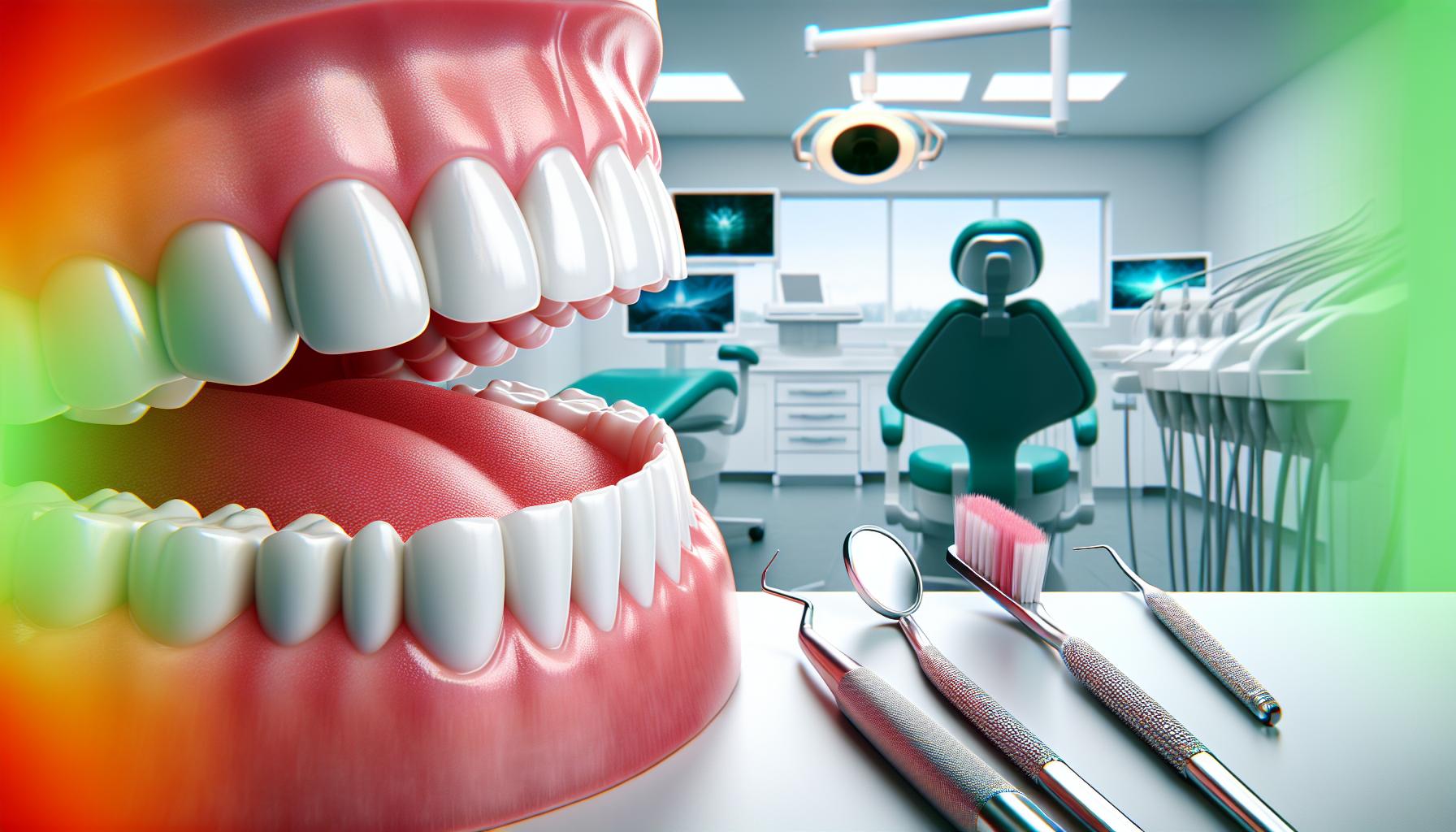Gum health plays a crucial role in overall dental well-being, yet many people overlook the signs of gum issues until it’s too late. From mild inflammation to more severe gum disease, the mouth can experience various challenges that affect not just teeth but overall health. This raises an intriguing question: can gums heal themselves?
Understanding the body’s natural healing processes is essential. The gums, like other tissues, have the potential to regenerate and recover when given the right care and attention. With proper oral hygiene practices and lifestyle adjustments, individuals may find that their gums can indeed bounce back from minor issues. Exploring the factors that influence gum healing can empower readers to take charge of their dental health and foster a brighter, healthier smile.
Can Gums Heal Themselves
Gum health plays a crucial role in maintaining overall dental well-being. Healthy gums appear pink, firm, and fit snugly around teeth. Early signs of gum issues include redness, swelling, and bleeding during brushing or flossing. Ignoring these signs can lead to more severe problems, such as gum disease or tooth loss.
Gums can heal under specific conditions. With proper care and attention, including regular dental check-ups and effective oral hygiene practices, gums can regenerate. Daily brushing with fluoride toothpaste, flossing, and rinsing with antimicrobial mouthwash minimizes plaque buildup, which is vital for gum health.
Lifestyle changes significantly impact gum health. A balanced diet rich in vitamins and minerals, especially vitamin C, supports gum regeneration. Reducing tobacco use and managing stress levels also contribute to improved gum health. Staying hydrated helps maintain oral moisture, which is essential for preventing gum irritation and infection.
Regular dental visits allow for early detection and intervention of gum problems. Dentists can provide professional cleanings, tailored advice on oral care routines, and treatments for existing gum issues. Prioritizing gum health leads to a healthier smile and overall enhancement in quality of life.
The Healing Process of Gums

Gums possess natural repair capabilities that allow them to heal under certain conditions. Understanding these processes and the factors that influence them is crucial for promoting gum health.
Natural Repair Mechanisms
Gums can regenerate through various biological mechanisms. The process involves the proliferation of epithelial cells and the formation of new connective tissue. Growth factors, enzymes, and proteins play essential roles in this reparative process. For instance, the body produces platelets in response to injury, which release growth factors that stimulate tissue repair. Additionally, saliva contains antimicrobial properties that aid in reducing inflammation and supporting healing. These natural repair mechanisms highlight the potential for gum tissue to recover when provided with the right support.
Factors Affecting Healing
Several factors can influence the healing process of gums.
- Oral Hygiene: Regular brushing and flossing prevent plaque buildup and gingivitis, facilitating healing.
- Nutrition: A balanced diet rich in vitamins C and D strengthens gum health and promotes healing.
- Lifestyle Choices: Tobacco use and excessive alcohol consumption impede blood flow and hinder recovery.
- Stress: High stress levels can weaken the immune system, reducing the ability of gums to heal.
- Medical Conditions: Chronic diseases like diabetes impact gum health and delay healing.
Addressing these factors enhances gum recovery and maintains overall oral health.
Common Factors That Damage Gums
Several factors contribute to the deterioration of gum health. Understanding these factors helps in taking proactive measures to protect gum tissue.
Poor Oral Hygiene
Poor oral hygiene leads to the accumulation of plaque, which can harden into tartar. Tartar irritates the gums, causing inflammation and gingivitis. Brushing twice daily with fluoride toothpaste, flossing regularly, and using an antimicrobial mouthwash significantly reduce plaque buildup. Neglecting these practices increases the risk of gum disease and tooth loss.
Smoking and Tobacco Use
Smoking and tobacco use are major risk factors for gum damage. These habits reduce blood flow to the gums, impair healing, and increase inflammation. Studies show that smokers are three times more likely to develop gum disease than non-smokers. Eliminating tobacco improves gum health and enhances recovery from gum issues.
Nutritional Deficiencies
Nutritional deficiencies directly impact gum health. Insufficient intake of vitamins C and D contributes to weakened connective tissue and increases susceptibility to gum disease. A balanced diet rich in fruits, vegetables, whole grains, and lean proteins provides essential nutrients for maintaining healthy gums. Proper nutrition supports healing and prevents further damage to gum tissue.
Methods to Promote Gum Healing
Promoting gum healing involves a combination of effective oral care practices and dietary adjustments. These methods support the regeneration of gum tissue and enhance overall gum health.
Best Practices for Oral Care
- Brush Twice Daily: Use a soft-bristled toothbrush and fluoride toothpaste to gently brush teeth for two minutes, ensuring thorough coverage without damaging gums.
- Floss Daily: Flossing removes plaque and food particles between teeth and under the gumline, reducing the risk of gum disease and promoting healing.
- Use Antimicrobial Mouthwash: An antibacterial mouthwash can help reduce plaque and gingivitis by killing harmful bacteria.
- Regular Dental Check-Ups: Schedule cleanings and examinations every six months for professional evaluation and removal of tartar.
- Quit Tobacco Use: Eliminating smoking and other tobacco products significantly improves gum health by reducing inflammation and promoting healing.
- Increase Vitamin C: Consume foods rich in vitamin C, like oranges, strawberries, and bell peppers, which support collagen production and gum tissue repair.
- Include Vitamin D: Ensure adequate vitamin D intake through foods like fatty fish and fortified dairy, as this vitamin plays a crucial role in bone and gum health.
- Stay Hydrated: Drink plenty of water daily to promote saliva production, which aids in neutralizing acids and washing away food particles.
- Limit Sugar Intake: Reducing sugar-laden foods minimizes plaque buildup, decreasing the chances of gum irritation and disease progression.
- Eat a Balanced Diet: Focus on whole foods, including fruits, vegetables, lean proteins, and whole grains, to provide essential nutrients that support gum health.
When to Seek Professional Help
Recognizing signs that indicate the need for professional dental assistance is crucial for maintaining gum health. Individuals should consult a dentist if they experience any of the following:
- Persistent Bleeding: Gums that bleed regularly during brushing or flossing, especially beyond a few days, require evaluation.
- Severe Pain or Discomfort: Any significant pain in the gums may signal an underlying issue that necessitates professional assessment.
- Receding Gums: Visible shrinking of the gums away from the teeth indicates potential gum disease that needs intervention.
- Unusual Swelling or Redness: Swollen or reddened gums that do not improve with proper oral care could suggest an infection or inflammation.
- Changes in Bite or Tooth Position: Shifting teeth or alterations in bite alignment might indicate gum disease or other oral health issues.
- Bad Breath: Chronic bad breath, not alleviated by oral hygiene practices, may stem from gum infections or decay.
Addressing these symptoms promptly can prevent further complications and preserve overall dental health. Regular dental check-ups enhance the ability to diagnose and treat problems early.
Oral Hygiene Practices
Gum health plays a crucial role in maintaining overall dental wellness. With the right care and commitment, gums can indeed heal themselves. By adopting effective oral hygiene practices and making positive lifestyle choices, individuals can significantly enhance their gum regeneration potential.
Recognizing the early signs of gum issues and taking proactive measures can make all the difference. Regular dental visits and a balanced diet rich in essential vitamins are vital for supporting this natural healing process. Prioritizing gum health not only improves smiles but also contributes to long-term health benefits.
